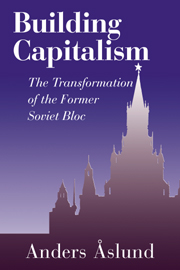Book contents
- Frontmatter
- Contents
- List of Tables and Charts
- Acknowledgments
- List of Abbreviations
- Introduction
- 1 What Communism Actually Was
- 2 The Decline and Fall of Socialism
- 3 Strategic Policy Choices
- 4 Changes in Output and Their Causes
- 5 Liberalization
- 6 Financial Stabilization
- 7 Privatization
- 8 Social Developments and Policy
- 9 State and Politics in the Transformation
- 10 Role of the Outside World
- 11 Conclusions
- Bibliography
- Index
1 - What Communism Actually Was
Published online by Cambridge University Press: 15 September 2009
- Frontmatter
- Contents
- List of Tables and Charts
- Acknowledgments
- List of Abbreviations
- Introduction
- 1 What Communism Actually Was
- 2 The Decline and Fall of Socialism
- 3 Strategic Policy Choices
- 4 Changes in Output and Their Causes
- 5 Liberalization
- 6 Financial Stabilization
- 7 Privatization
- 8 Social Developments and Policy
- 9 State and Politics in the Transformation
- 10 Role of the Outside World
- 11 Conclusions
- Bibliography
- Index
Summary
A decade after the end of communism, it is difficult to imagine that once upon a time many intelligent people believed that socialism was superior to capitalism and democracy. They thought that a benign almighty state would have higher aims than a messy democracy and would be better at executing its altruistic ideals as well. Numerous ideas we take for granted were alien to communists.
Socialist paraphernalia have faded in the postcommunist countries, but multifarious remnants persist. Marxist–Leninist ideas, the actual socialist system, its crises and collapse conditioned the transition. We need to recall the communists' major ideas. I shall also outline what the Soviet-type system actually amounted to.
In many ways, the essence of communism was to free the Communist Party and the state from all possible constraints. Checks and balances were intentionally eliminated. The communists' aim was to render the transition to socialism irreversible. The purpose of this chapter is to show what they accomplished.
THE IDEAS OF COMMUNISM
Because our concern is the former Soviet bloc, I ignore the broader socialist debate and focus on Soviet-type communism. Soviet communists made a sharp distinction between socialism (the existing system) and communism (a future Utopia). However, because the rulers called themselves communists, the international practice has been to label their system “communist,” and I use “socialist” and “communist” as synonyms for Soviet-type communism. Communism/socialism was quite different from West European social democracy.
Most fundamental socialist ideas were formulated by Karl Marx and his contemporaries. In a Hegelian spirit, Marx thought of history in stages of development.
- Type
- Chapter
- Information
- Building CapitalismThe Transformation of the Former Soviet Bloc, pp. 20 - 38Publisher: Cambridge University PressPrint publication year: 2001



